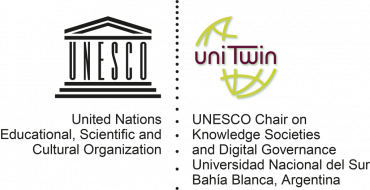The UNESCO Chair on Knowledge Societies and Digital Government aims at supporting the creation of a pole of excellence at UNS focused on the promotion and incubation of innovative digital solutions. Within this context, the Chair will conduct research on strategic applications of digital technologies to develop Knowledge Societies and Digital Government; develop high-quality postgraduate programs and new courses for undergraduate students; and develop executive training offered on issues relevant to Knowledge Societies and Digital Government. While conducting research, the Chair will seek to bridge the gap between research and practice by working collaboratively with government organizations, other academic institutions, the private sector and civil society, and will foster partnerships between government institutions, businesses and entrepreneurs to nurture knowledge and technology-based companies. In addition, the Chair will promote local, national,regional, South-South and North-South cooperation, including exchange of lecturers and students,implementation of mechanisms for sharing knowledge and experience, organization of events, and network-building, among others.
The theme is relevant due to the significance of Knowledge Societies, Digital Government and the linkage between the two to sustainable development. Regarding Knowledge Societies, the impact that knowledge and information has on people’s lives, as well as the impact of digital technologies on information and knowledge sharing for transforming economies and societies are well documented by UNESCO. Regarding Digital Government, since governments around the world started to apply digital technologies in their internal operations and service delivery systems in early 1990s, the concept and practice of Digital Government has been constantly evolving. The latest stage,Contextualization, aims at Digital Government supporting specific efforts by countries, regions, cities,groups, communities and other territorial or social units to develop themselves.
Three arguments can be advanced to elaborate the relationship between Knowledge Societies and Digital Government:
- Digital Government Evolution – The Digital Government landscape is continuously evolving considering both how this concept is researched and taught, and how it is adapted and adopted in government policy and practice.
- Digital Government Responsiveness – The Digital Government evolution reflects how governments are trying to find innovative digital solutions to economic, social, cultural, political and other pressures facing them, based upon technologies available at the time, and how they absorb and institutionalize such digital innovations in their daily practice.
- Digital Government Enabling Knowledge Societies – The forces of the Digital Government evolution, including the pressures on governments and how governments respond to such pressures, are putting Digital Government in a central position to enable the development of Knowledge Societies as the end and as the means to Sustainable Development. The future success of Digital Government is directly related to this enabling role.
Based on the context explained above, the UNESCO Chair on Knowledge Societies and Digital Government will have significant impact on building human and institutional capacities of governments and social actors, empowering them to develop Knowledge Societies through Digital Government initiatives and to contribute to efforts for achieving SGDs. Examples include offering postgraduate education for future leaders and digital entrepreneurs, offering executive training for government officials, research-technology transfer, nurturing technology- and knowledge-based enterprises, experience- and knowledge-sharing, raising stakeholders’ awareness, and others.
